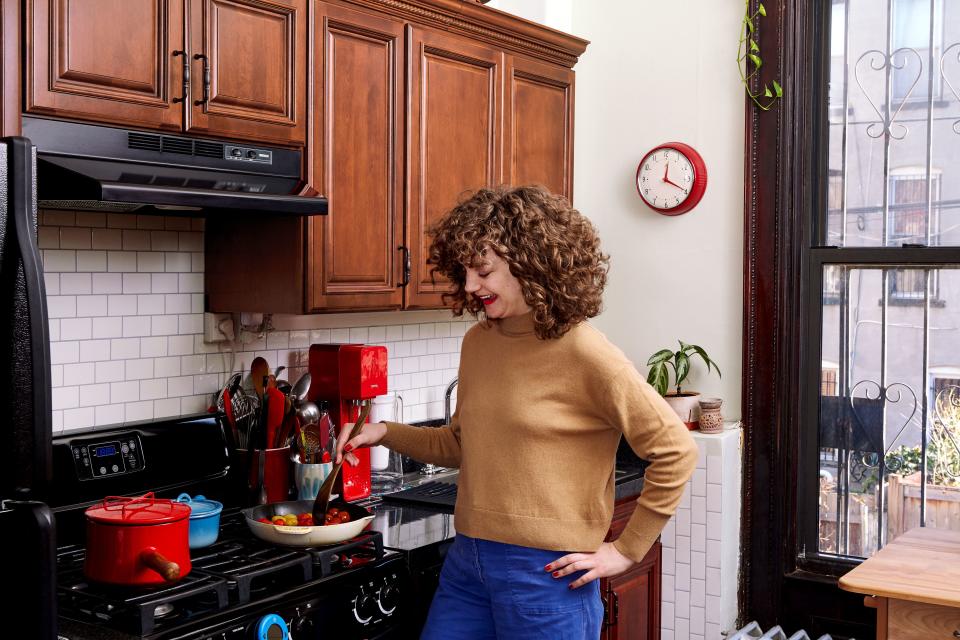How a Small Kitchen Can Make You a Better Cook
The first kitchen I shared with my husband had no counters. There was simply not a space where you could set a plate next to the sink, let alone a cutting board. This kitchen, in the tiny 4th floor walkup apartment that was our home during his graduate school and post-doc years, was also our dining room. And his office. We pushed an Ikea island/cupboard against the wall, precariously balanced all pantry items on some rickety metal wall shelves, stuffed the fridge full of beer, and proceeded to invite friends over for dinner.
Fast forward a dozen years, and I still think about excellent evenings spent in that kitchen. Its tiny size didn’t hold us back from cassoulet parties for eight or weekend cheesecake-baking marathons. I’d always thought that if you were lucky enough to have your choice of kitchens, you’d go with the fantasy: miles of gleaming countertop and a stacked pair of ovens. But the truth is, most of us are never given that choice, and maybe we’re better for it. Cooking in a small kitchen all these years has actually made me a better home cook. And I’m not the only one.
While making breakfast, lunch, and dinner for my extended family at a vacation rental last summer, I was struck by how frequently and inefficiently I circled the sprawling space: I’d wander around putting things in cabinets and drawers and hunting for pans, crossing the room to recycle cans and make trips to the fridge. I was getting exercise. And the kitchen is not the place where I want to get that kind of exercise.

Anna Stockwell, Stove - HERO
I sorta missed my small kitchen at home. A tiny kitchen can feel cramped if too many people hover, but when it’s just you steering the ship, the economy of movement can help get you to that moment where muscle memory takes over. Your body knows the pivot needed to grab a spatula, the single step required to pull out a pot lid. If everything’s arranged well, the dance is tight.
And when you’re in a small kitchen, you’re in it; you’re right there as your onions start to deepen from translucent to golden. It’s easy to see and smell everything that’s going on, even if you’re stirring two pots while chopping at your cutting board. You’re powerful, many-armed, the master of your domain.
In a larger space, stuff starts sprawling. Because there’s room, random pantry items and rarely-used appliances start sitting lazily on the counters. The idea of what lives where can get casual. In a small kitchen, though, you need to have systems, argues Leah Koenig, author of The Jewish Cookbook, who tested all the recipes for her six cookbooks in space that’s seven feet wide. Having “a place where everything lives and goes back to when you’re done using it,” Koenig says, means you don’t have to hunt for the food processor lid or a can of beans. Chef Preeti Mistry, who has been cooking in what she calls a “tiny cabin kitchen” in Sonoma lately, sets the rule that nothing goes on the counter but salt, pepper, and frequently used oil. The same is true for equipment: “You don't need 30 different knives,” Mistry advises. “Don’t hold onto crap you don't use.”
Is it too much to claim that streamlining your kitchen helps organize the internal chaos, too? Maybe, but small kitchens do, in their way, train our brains: “Because my space is limited, I have to think several steps ahead,” says my friend Marisa McClellan, author of four cookbooks on preserving food, who has been cooking (and canning hundreds of pounds of tomatoes) in a 1960s-era galley kitchen for her entire adult life. “I never take a pan out of the oven without thinking through where it's going to land.” (Marisa also says her knife skills have had to improve, since she doesn’t have much counter space to lay out prepped ingredients as she cooks: “I am super fast with the knife so I can chop and dump before anything burns.”)
Of course, you have to work at making a small kitchen into your happy place. Walls are essential for vertical storage, says Epi’s kitchen guru, Anna Stockwell, who also keeps a credenza of dishes and flatware in her dining area. “But I also make sure to have artwork on the wall, and plants, and crystals, and some sentimental knickknacks, too—and always a vase of flowers on my counter, because working in a beautiful space, even if it's small, is always better.” When she found out that her kitten, Francis, has heart disease, she added a vintage St. Francis tile to her counter area: “I like having St. Francis there in my kitchen to watch over us. Those touches are important to me: they make my kitchen feel like my kitchen.”
And that’s where the good stuff happens: “Having limited space means getting creative, and when that part of your brain is engaged, you may actually find new, interesting ways to cook that you may not have thought of when you had all the space in the world,” says Mistry. “I always have epiphanies and victories when under constraints.”
Originally Appeared on Epicurious

